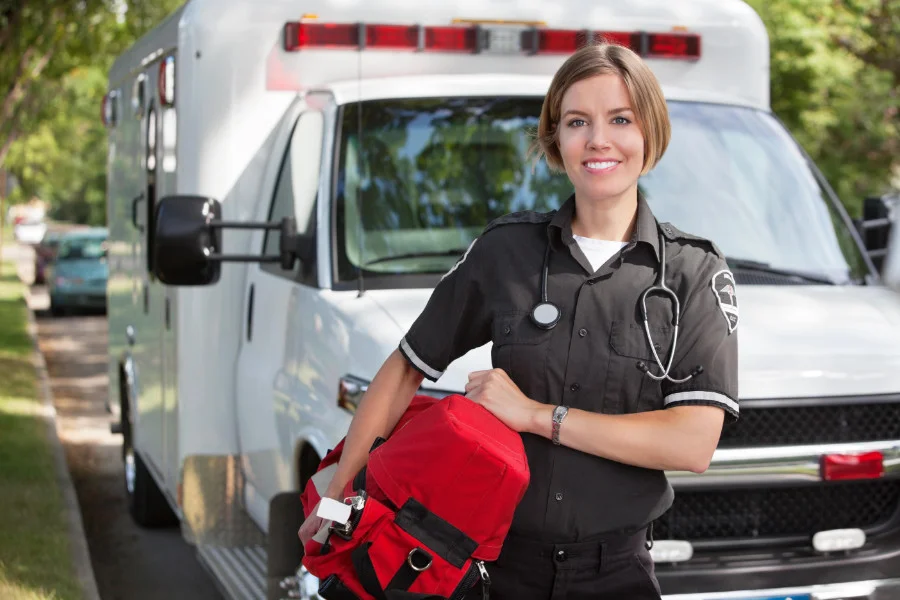An Emergency Care Assistant (ECA) is a crucial member of the emergency healthcare services. They work alongside paramedics, providing immediate care during emergencies, and play a key role in the pre-hospital treatment of patients.
Responding to Emergency Calls
Emergency Care Assistants (ECA’s) are a crucial first response to emergency calls. In partnership with paramedics, they are responsible for delivering potentially life-saving care to patients in critical situations. Each call they receive can be a matter of life or death, making their role incredibly vital. The immediate care they provide can greatly influence a patient’s prognosis.
But Emergency Care Assistants do more than just provide immediate medical help. They also play a crucial role in safe patient transportation. In fact, they often stabilize patients for transport. This process ensures that their condition doesn’t worsen while on the move. Next, they guarantee a smooth journey to the hospital. It involves monitoring the patient’s condition continuously and adjusting support as necessary.
They are also in charge of performing a clear handover to the hospital staff. This handover isn’t a simple task. They must meticulously detail the emergency care provided to the patient. This step is vital, as it enables the hospital team to continue the appropriate care immediately. Thus, an Emergency Care Assistant’s duties go far beyond immediate interventions. They provide continuous, critical support until the patient is safe in the hands of hospital staff.
Attending Accidents and Emergencies
ECAs are trained to deal with a wide range of accidents and emergencies. Whether it’s a minor road accident or a major industrial incident, they are expected to be present and ready to provide care. They use their training in emergency driving to navigate swiftly through traffic, regardless of the distance or time of day. The faster they reach the scene, the sooner they can provide help. It’s a high-pressure role, as they often work against the clock to deliver care and minimize the impact of the emergency on the patient’s health.
Administering Essential Emergency Care
As integral team members in emergency medical services, Emergency Care Assistants (ECAs) shoulder numerous critical duties. In field emergencies, they work directly under paramedic supervision. They jump into action, addressing pressing tasks swiftly and competently.
One key task involves controlling severe bleeding. They apply pressure and use appropriate medical tools to stem blood flow. This swift intervention can prevent patients from slipping into shock.
Next, they treat wounds with precision and care. This involves cleaning, sterilizing, and dressing the injuries. Their meticulous attention can prevent infections, a crucial step in safeguarding patient health.
Additionally, ECAs manage potential spinal injuries. Here, they ensure immobilization of the patient to avoid movement-induced harm. This careful management mitigates risks of long-term damage, preserving patient mobility and quality of life.
In essence, the role of an ECA is pivotal. They serve as front-line responders, ensuring immediate care for patients and contributing to overall survival and recovery outcomes.
These actions are critical as they can significantly influence a patient’s survival and recovery. The ability to perform these actions swiftly and efficiently, often in challenging and chaotic environments, is a testament to their skills and training.
Using Defibrillators and Administering Drugs
As part of their extensive training, ECAs are proficient in using defibrillators, a crucial tool for resuscitating patients experiencing heart failure. This procedure can be the difference between life and death, underscoring the weight of their responsibilities.
They are also trained in administering a variety of drugs, from painkillers to more specific medications, based on the patient’s condition. This part of their job requires them to have a deep understanding of these drugs, their uses, and potential side effects.
Responding to Any Emergency Situation
The job of an Emergency Care Assistant is unpredictable; they must be ready to respond to any emergency situation that arises. They might be attending to a victim of a road accident one moment, and the next, they could be treating a heart attack victim in a busy shopping center.
Regardless of the situation’s severity or nature, they must maintain their composure and professionalism, providing care to the best of their abilities. They must also handle the emotional aspects of the job, as they often deal with patients and family members who are in distress.
Gathering Relevant Information
Accurate information is vital during emergencies. ECA’s are trained to quickly and effectively gather relevant details from carers or others at the scene. This can be a challenging task, as these individuals may be highly distressed or aggressive due to the situation.
Despite this, ECA’s must extract the necessary information to assist in the provision of care. This could include understanding the patient’s medical history, the circumstances leading to the emergency, and any other pertinent details.
Checking Vehicles and Communicating with Colleagues
Apart from their immediate patient care duties, and Emergency Care Assistant is also responsible for the condition of their vehicles. Regular checks must be carried out to ensure the vehicle is clean, fueled, and stocked with the right supplies. This includes maintaining the cleanliness of the vehicle to prevent infections and ensuring all necessary medical supplies are available for the next emergency.
An Emergency Care Assistant must complete paperwork related to each call they attend, which can include patient reports and incident logs. Communication is also a key part of their role. Using various communication equipment like radios and telephones, ECA’s keep in touch with their colleagues, sharing crucial information and updates about the patient’s condition and the situation at hand. This constant communication helps the entire team to work together more effectively, ensuring that the patient gets the best possible care.

Jeromy VanderMeulen is a seasoned fire service leader with over two decades of experience in emergency response, training, and public safety management. He currently serves as Battalion Chief at the Lehigh Acres Fire Control & Rescue District and is CEO of the Ricky Rescue Training Academy, a premier provider of online and blended EMT and firefighter certification programs in Florida.
Jeromy holds multiple degrees from Edison State College and the Community College of the Air Force, and is pursuing his MBA at Barry University. He maintains top-tier certifications, including Fire Officer IV, Fire Instructor III, and Fire Inspector II, and has served as a subject matter expert for a court case. He is a member or the Florida Fire Chiefs Association.
Jeromy also contributes to state-level fire safety regulation and serves on several hiring and promotional boards.

